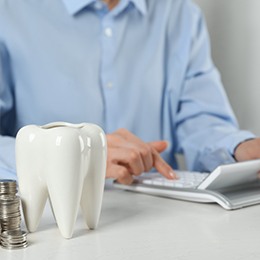Emergency Dentist— Concord, NH
Get the Relief You Need Quickly!
Dental emergencies can be pretty sudden and scary, especially when they affect your loved ones. The good news is that your emergency dentist in Concord is always here to help! Whether your family suffers a sudden traumatic injury or severe oral pain, our dentists will provide you with unconditional support. That means we’ll quickly address your mouth’s aches, pains, and other urgent issues. So, please keep reading to learn more or book a same-day visit now!
Why Choose Generations Dental Care for Emergency Dentistry?
- Same-Day Emergency Appointments Available
- Top-Tier Sedation That Keeps Patients Calm
- A Highly Skilled & Experienced Dental Team
How We Treat Dental Emergencies

If you suffer a dental emergency, please don’t panic. We at Generations Dental Care will gladly walk you through our way of solving it. In particular, you should expect four things from our treatment process:
- A Same-Day Visit – We’ll set your visit as soon as possible when you call us, perhaps even the very same day. Once we have, our team can provide care tips over the phone while you wait.
- An Emergency Exam – When you arrive for care, our dentists will perform a quick (but thorough) emergency exam. This step lets us confirm your problem and how to ease your pain.
- Review of Findings – We’ll share our findings with you after the exam, as well as a few relevant procedures. Our team will then draft a treatment plan using your feedback. Rest assured, we’ll explain the relevant cost(s) and time before you commit.
- Proper Dental Care – We’ll quickly fix your smile when your final treatment plan is ready. Since we have plenty of skill and experience, please trust us to get your grin back on track! We’ll provide you with dental crowns, fillings, root canals, or whatever else you need.
The Most Common Dental Emergencies
True enough, you should always call our office if you have a dental emergency. We can then schedule your visit, solve your oral problem shortly, and ensure your long-term oral health. However, you can take steps to handle your dilemma while you wait for care. These tips and tricks would even make the final treatment go more smoothly. For more details, click on one (or more) of the icons below and use the related information.
Understanding the Cost of Dental Emergencies

Since every dental emergency differs, the price of fixing one varies by patient. You’ll need to consult our dentists for a precise estimate; they’ll narrow down the final expense. Still, we’ll do our utmost to guide you through your care’s cost factors, dental insurance, and similar factors. Knowing such things can help make treatment as affordable as possible. To learn more about the cost of dental emergencies, please keep reading or call our office soon!
How to Prevent Dental Emergencies

Dental emergencies can happen unexpectedly, but many are avoidable if you take the proper precautions! At Generations Dental Care, we believe prevention is the best approach to protect your smile and avoid costly treatments and stressful scheduling. With a few simple habits and being mindful of your lifestyle choices, you can significantly reduce your risk of dental disaster. Read more below to learn how you can safeguard your teeth and gums from unexpected issues!
Visit Your Dentist Regularly

Even with perfect home oral care, there will still be areas in your mouth you have trouble reaching. Routine dental checkups and cleanings are the other vital half of your complete toothcare routine. They’re also one of the most effective ways to prevent dental emergencies!
Our team recommends visits at least twice a year for cleanings and exams. These appointments let us catch potential problems—like cavities or gum disease—before they become more serious.
Maintain Good Oral Hygiene Habits at Home

Daily brushing and flossing are critical for supporting a healthy smile. Plaque and bacteria build-up can lead to tooth decay or gum disease, which might cause emergencies like toothaches, dental abscesses, and even tooth loss if left untreated!
So, brush at least twice a day with fluoride toothpaste, floss daily, and consider using an alcohol-free mouthwash to keep oral bacteria at bay. At our Concord office, we’ll guide you on the best home care practices to protect your smile!
Be Careful with Your Diet

What you eat directly affects your oral health. Sugary and acidic foods increase your risk of cavities and enamel erosion, which can accelerate issues like cavities. Instead, focus on a balanced diet rich in fruits, vegetables, and calcium-packed foods to strengthen your teeth.
You should also moderate the number of syrupy or hard snacks you consume on a regular basis. This will reduce your risk of cracking or chipping your pearly whites and limit the time sticky sugars cling to your smile.
Wear a Mouthguard

A good mouthguard is essential if you play sports or grind your teeth at night. These devices protect against injuries like chipped teeth, jaw damage, or oral cuts caused by impacts or grinding.
At Generations Dental Care we offer nightguards for patients suffering from bruxism, ensuring maximum protection and peace of mind. When it comes to a mouthguard for sports, a custom-fitted mouthguard is best, but even a simple boil-and-bite guard from a sporting goods store is better than nothing!
Use Tools, Not Teeth to Open Packaging

Using your teeth to tear open packaging or cut objects can cause chips, cracks, or even tooth loss! To avoid the risks, always grab scissors or appropriate tools for every job. This avoids unnecessary strain or damage to your pearly whites. Be sure to treat your teeth with care—they’re the only ones you’ve got and are not for opening bottles or bags!
Dental Emergency FAQs
How Do I Know If I Have a Dental Emergency?
There are a few signs to look for if you’re dealing with a dental emergency:
- Bleeding
- Swelling
- Broken or Knocked-Out Tooth
But if you want to err on the side of caution, any time you are feeling serious pain in your oral cavity (i.e. teeth, gums, lips, tongue, cheeks, throat, jaw), it’s best to contact our office and alert us to the situation. By describing your current state and what transpired, we can better determine if you should get in to see us immediately.
What Can I Take to Help with Tooth Pain?
When a toothache occurs, you will do just about anything to get rid of the pain. If you find yourself looking for pliers, stop. While the discomfort might be unpleasant or almost debilitating, there are things you can take or use to help alleviate some of the pain, including:
- An ice pack or cold compress – This will reduce swelling and help with the pain
- Salt and hot water mixture – This will reduce any irritation and aching feeling
- Hydrogen peroxide and water – You can gargle with this mixture, but make sure to spit it out
- Apple cider vinegar – Using a cotton ball, soak it in the vinegar and place it on the aching tooth to relieve discomfort and swelling
How Long Does a Toothache Last?
Much of this depends on what is causing your toothache. In most situations, a toothache should never last more than a day; however, if after 1-2 days your pain is not going away, go ahead and call our office. Once we are able to thoroughly examine the tooth, we will be able to determine what is the reason for the pain and how best to treat it.
Should I Go to the Emergency Room?
If you are experiencing a traumatic injury to your mouth, it is understandable that you would want to go to the emergency room; however, depending on the situation, you could be forced to sit in a waiting room for hours before seeing a doctor. In the majority of cases, our team can quickly diagnose the problem and administer the correct method of treatment, but if you are dealing with continual bleeding that will not stop, severe swelling, or a broken or dislocated jaw, you should visit your local ER as soon as possible.

